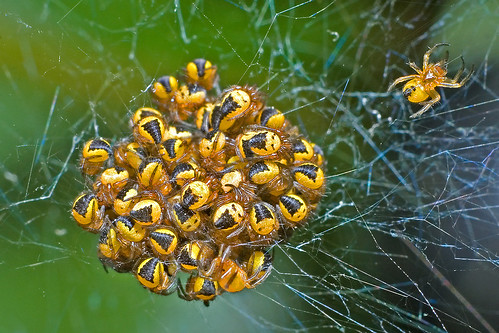Many of the examples of suppression of competition within groups Steve gives are due to kin selection. Steve disagrees with this, writing:
[...] the main weakness of the theory was also apparent. Extensive cooperation occurs between nonrelatives. Different genes in genomes are functionally integrated but not related. Larger human societies often have many highly cooperative but distantly related individuals. Some of this cooperation between nonkin can be explained by extensions of reciprocity to a general notion of mutual benefit for interacting partners (West Eberhard 1975).In the early 1980s, kin selection plus these extended notions of reciprocity were the main conceptual tools. Those limited conceptual tools led to blind spots about unsolved problems. Only rather forced theories of mutualism could work for the nearly complete integration of genes into cooperative genomes. Only a very enthusiastic belief in the scope of reciprocity could explain the broad social integration in larger groups of weakly related human
However, cooperation between groups of "unrelated humans" that is not due to reciprocity has turned out to be largely associated with cultural kin selection. This is kin selection applied to memes - not genes. Many of Steve Frank's examples fit onto the familiar kin selection / group selection axis - though he apparently doesn't fully realise this.
There is indeed another force that produces cooperation besides reciprocity and kin selection - and that is "manipulation". Manipulation is where agents impose their wills on other agents. Teams sometimes cooperate because they are cooerced into doing so by supervisor figures. Manipulation helps to explain suppression of competition in cooperative genomes. The efforts of individual genes to bypass meiosis is thwarted by the "parliament of genes" in the genome. Manipulation isn't the same as kin selection or reciprocity - so Steve Frank's paper is partly correct.
However, I think that there's a good reason to call this "manipulation" and not "suppression of competition". "Suppression of competition" is just another way of saying "cooperation". Explaining cooperation in terms of "suppression of competition" seems pretty circular to me.
Manipulation is responsible for the symbiont hypothesis of eusociality. This was proposed in 1934. The "parliament of genes" phrase comes from Leigh (1971). Since manipulation is such an obvious and well-known phenomenon, there may well be earlier examples of it being involved to explain cooperative behaviour. As a theory of cooperation, the idea is not exactly new - and I'm pretty sure that Richard Alexander wasn't responsible for it.
In The Biology of Moral Systems, Richard Alexander wrote:
It is a common error to suppose that something additional to nepotism and reciprocity is required to account for the structure of society. (p.153)Here it sounds as though he repudiates this particular revolution.
 I briefly analyzed the paper:
I briefly analyzed the paper:
 The popular presentation of the kin selection vs group selection affair still seems to be very confused. For example, consider the coverage of a recent study by some group selection advocates: "
The popular presentation of the kin selection vs group selection affair still seems to be very confused. For example, consider the coverage of a recent study by some group selection advocates: "